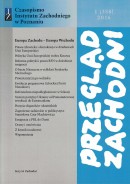Wpływ Traktatu o dobrym sa˛siedztwie i przyjaznej współpracy na rozwój współpracy pomiędzy organizacjami pozarządowymi
The Effect of the Treaty on Good Neighbors and Friendly Cooperation on the Development of Cooperation among NGOs
Author(s): Hubert OwczarekSubject(s): Politics / Political Sciences
Published by: Instytut Zachodni im. Zygmunta Wojciechowskiego
Summary/Abstract: The treaty on ,,good neighbors and friendly cooperation’’ was a stepping stone on the road to normalization of Polish-German relations and its ratification was preceded by numerous efforts and actions on the part of enlightened politicians, Church hierarchs and representatives of the academia. For the NGOs, however, less prominent matters, especially the establishment of institutions which were meant to support Polish-German contacts, were of greater practical importance. The two major such institutions are the Foundation for Polish-German Cooperation and the Polish-German Youth Exchange. By supporting joint Polish-German projects in both countries they significantly influenced the development of Polish-German relations. In the first decade of their activity, due to large disproportion in the financial possibilities of the two partners, support of the Congresses of Polish-German and German-Polish Societies by the Foundation for Polish-German Cooperation enabled the Polish side to participate on equal terms in events that could be described as an intermediate form between a social gathering, a meeting of citizens engaged in a common enterprise and workshops that created ample opportunity to cope with new challenges in Polish-German relations. The Poznan´ organization availed itself of all the received invitations and often even requested additional cards of participation. In the second decade, the congress meetings were abandoned, so the Foundation started to offer greater support to Polish-German projects created by NGOs, local governments, schools and cultural institutions. Implementation of the provisions of the treaty proved advantageous for the Polish-German Society in Poznan´ in terms of the support it obtained for its own projects organized alternately in Wielkopolska and the federal states of the FRG together with the German-Polish Societies, especially those from Lower Saxony. Such projects helped their participants to learn about the culture, traditions and prospects of development of the partner nation and triggered new Polish-German contacts on a personal and organizational level, which also contributed to the development of exchange between Polish and German schools. Through this area of activity, presented by the regional mass media, the Polish-German Society in Poznan´ positively influenced the Polish-German relations in the region .
Journal: Przegląd Zachodni
- Issue Year: 337/2011
- Issue No: 02
- Page Range: 201-219
- Page Count: 19
- Language: Polish

